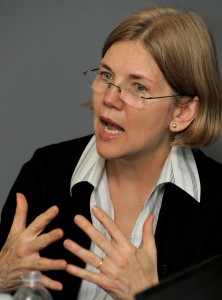Elizabeth Warren’s campaign
Democratic Senate candidate Elizabeth Warren yesterday won a clear road to an Election Day showdown with U.S. Sen. Scott P. Brown, capturing the Democratic nomination with enough votes to avoid a primary election with her Democratic challenger Marisa DeFranco.
“I’ve got just one thing to say – Are you ready?” Ms. Warren shouted from the stage of the MassMutual Center to screams of affirmation from delegates after it was announced that she won 95 percent of the delegate votes for the nomination. “Are you ready to stop the Republicans from taking over the U.S. Senate?” she asked.
Ms. DeFranco, a Middleton attorney who campaigned with little money for more than the past year, failed to get the required 15 percent of the delegate votes needed to force a primary for the Democratic nomination.
State Democratic Chairman John Walsh said that until yesterday, no candidate had ever exceeded 85 percent of the delegate vote in a contested nomination process at a state convention to eliminate a primary challenge.
Ms. Warren, running for office for the first time, vowed to reclaim “the people’s seat” from Mr. Brown, and zeroed in on his record in an address that brought the crowd of approximately 4.000 delegates to their feet. She barely mentioned Ms. DeFranco and remarked that voters did not get what they expected when they elected a Republican to the Senate four years ago. Ms. Warren said voters thought they were sending “a decent guy” to Washington.
“But boy, did he let us down. In no time at all, he chose Wall Street over Main Street, millionaires over the middle class, and big oil over big ideas” – Ms. Warren said.
Despite a five-week drubbing over her claims to Native American heritage, Democratic Senate candidate Elizabeth Warren remains neck and neck with US Senator Scott Brown, a Republican, as she heads into Saturday’s state party convention, a new Globe poll shows.
But there are signs that the controversy has wounded the first-time candidate, whose entrance into the race came with a star power that galvanized Democrats and catapulted the contest into one of the most closely watched in the nation.
The vast majority of voters (72 percent) said the issue would not affect their vote, but 31 percent of self-described independents (a critical voting bloc) said the issue makes them less likely to support Warren in November. The Harvard professor’s popularity has also risen one percentage point, to 48 percent, since the Globe polled in March, but the percentage of detractors has climbed more precipitously, by nine points to 32 percent.
The poll shows Brown in a strong position. The incumbent’s job approval rating is at a comfortable 60 percent, with just 31 percent of voters saying they disapprove of the work he is doing in Washington.
Still, the bottom line is that the race remains a toss-up, with Brown leading Warren 39 percent to 37 percent, largely unchanged from the Globe’s March poll that also showed Brown leading by two percentage points.
“Overall, this shows the strengths that Brown has and it shows the problems, obviously, that the Warren campaign has had” – said Andrew E. Smith, the Globe’s pollster.
But, with the race virtually tied and demographics that favor Democratic candidates in Massachusetts, “this will be a really close race all the way through” – said Smith, director of the University of New Hampshire Survey Center.
Democratic Senate candidate Elizabeth Warren has a powerful ally in Massachusetts – President Obama.
Though Republican presidential nominee Mitt Romney is a former Massachusetts governor, a poll released Sunday by The Republican and MassLive.com found little love for Romney in his home state. The poll, conducted by the Western New England University Polling Institute, found Obama leading Romney 56 percent to 34 percent, with 9 percent undecided.
That dynamic could have significant ramifications in the U.S. Senate race between Republican U.S. Sen. Scott Brown and Warren. Despite overwhelming support for the Democratic president, Brown and Warren are running neck-and-neck for the Senate. The poll numbers show that while an association with Obama helps Warren, an association with Romney actually hurts Brown. Both Brown and Warren must attract Obama supporters in order to win the race. So while Warren’s campaign has stressed her party ties, Brown has shunned his, focusing instead on his bipartisan work.
“Brown’s strategy would be to tie himself to the president to the extent that he can” – said Tim Vercellotti, director of the Western New England University Polling Institute and an associate professor of political science. “Brown talks about being there for bill signing ceremonies, being with the president. His whole theme is bipartisanship.”
Obama remains popular in the state that chose him over Republican presidential nominee John McCain by a 26-point margin in 2008. Obama’s job approval rating stood at 54 percent in the Western New England University poll, with 36 percent disapproving of the job he is doing. Fifty seven percent of voters had a favorable view of Obama, while 33 percent had an unfavorable view.
In contrast, just 36 percent of respondents had a favorable view of Romney while 50 percent viewed him unfavorably.
Warren has tried to take advantage of Obama’s popularity by emphasizing her connection to the president. One of Warren’s early television ads opened with a picture of Obama and Warren walking side by side, and featured Obama praising Warren for her work creating the Consumer Financial Protection Bureau.
The association is helping Warren. According to the poll, 30 percent of voters associate Warren “very closely” with Obama and another 36 percent associate them “somewhat closely.” Of those who associate the two, 31 percent said they are more likely to vote for Warren because of it and 27 percent are less likely.
